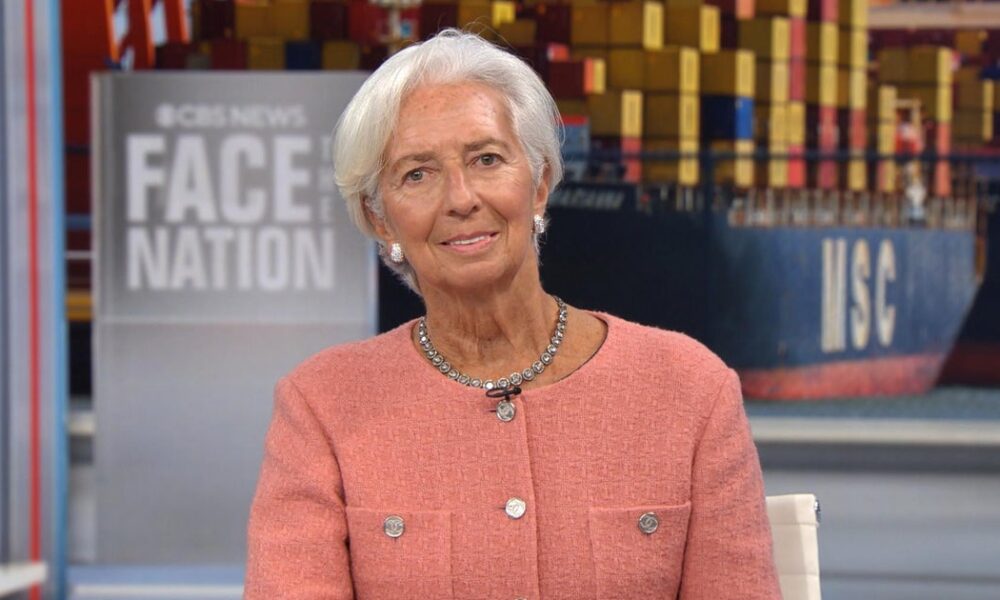In an interview aired on “Face the Nation” on October 19, 2025, Christine Lagarde, the President of the European Central Bank (ECB), addressed the ongoing transformations in the global economy. Lagarde highlighted the impact of tariffs and artificial intelligence as significant forces reshaping trade relationships and economic dynamics worldwide.
Transformative Forces in the Economy
Lagarde described the state of the global economy as one of transformation, emphasizing that tariffs have fundamentally altered trade patterns and alliances. She noted that these changes have resulted in new trade dynamics, particularly between the United States and Europe. The economic landscape is also being reshaped by advancements in artificial intelligence, affecting various sectors from data management to consumer interactions.
Margaret Brennan, the host of the program, pointed out the fluctuating stock market and its connection to the ongoing trade wars. Lagarde responded by referencing a forecast from S&P Global, which estimates that tariffs imposed by the Trump administration could cost global businesses upwards of $1.2 trillion in 2025, with significant financial burdens likely falling on consumers.
Implications of Tariffs and Trade Negotiations
Lagarde expressed concern that the full impact of these tariffs has yet to be felt. She explained that the tariff on European goods exported to the U.S. has surged from 1.5% to 13%, resulting in a complex distribution of costs among exporters, importers, and consumers. Lagarde suggested that the current economic squeeze on businesses could eventually lead to higher prices for consumers—an outcome that remains to be seen as companies evaluate their profit margins.
The discussion shifted to ongoing negotiations between the U.S. and China, particularly regarding tariffs and rare earth exports. Lagarde described the current posturing between the two nations as typical of negotiation tactics. She acknowledged China’s strong position in the rare earth market and suggested that the U.S. and Europe should collaborate to enhance their purchasing power in negotiations.
Brennan raised concerns about perceived divisions between the U.S. and Europe regarding their approaches to China. Lagarde clarified that while both sides share common interests, their tactical approaches may differ. She noted that European authorities might prefer to target specific industries rather than apply broad measures.
The Dollar’s Status and Future Challenges
In the interview, Lagarde also addressed the potential erosion of the U.S. dollar’s status as the world’s primary safe-haven currency. She indicated that recent trends, including a rise in cryptocurrency and an increase in gold prices by over 50% since January, suggest a growing uncertainty surrounding the dollar. Lagarde emphasized the importance of maintaining geopolitical credibility and strong institutions to preserve the dollar’s status.
As capital flows shift towards other regions, including Europe, Lagarde warned that the U.S. must remain vigilant to maintain its dominant position. She cited historical precedents, noting that trust in a reserve currency can diminish gradually before experiencing sudden shifts.
Support for Ukraine
On the matter of Ukraine, Lagarde discussed her recent conversation with President Volodymyr Zelenskyy regarding the use of frozen Russian assets. She proposed that these assets could be utilized as collateral for operational loans to support Ukraine’s recovery, emphasizing the need for a united approach among countries holding such assets. Lagarde suggested that a coordinated effort to use these funds for reconstruction could incentivize Russia to engage in negotiations.
As the interview concluded, Lagarde reiterated the importance of a credible environment for trade and economic stability, signaling that ongoing volatility could hinder the dollar’s strength and overall global economic health.







